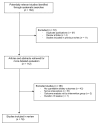Effects of worksite health promotion interventions on employee diets: a systematic review
- PMID: 20146795
- PMCID: PMC2829502
- DOI: 10.1186/1471-2458-10-62
Effects of worksite health promotion interventions on employee diets: a systematic review
Abstract
Background: Public health strategies place increasing emphasis on opportunities to promote healthy behaviours within the workplace setting. Previous research has suggested worksite health promotion programmes have positive effects on physical activity and weight loss, yet little is known regarding their effects on dietary behaviour. The aim of this review was to assess the effects of worksite interventions on employee diets.
Methods: Electronic databases (MEDLINE, The Cochrane Library, PsycINFO, EMBASE, LexisNexis) were searched for relevant articles published between 1995 and April 2009. Studies were eligible for inclusion if they were peer-reviewed English language publications describing a worksite-based health promotion intervention with minimum study duration of eight weeks. All study designs were eligible. Studies had to report one or more diet-related outcome (energy, fat, fruit, or vegetable intakes). Methodological quality was assessed using a checklist that included randomisation methods, use of a control group, and study attrition rates.
Results: Sixteen studies were included in the review. Eight programmes focussed on employee education, and the remainder targeted change to the worksite environment, either alone or in combination with education. Study methodological quality was moderate. In general, worksite interventions led to positive changes in fruit, vegetable and total fat intake. However, reliance on self-reported methods of dietary assessment means there is a significant risk of bias. No study measured more robust outcomes such as absenteeism, productivity, or healthcare utilisation.
Conclusions: The findings of this review suggest that worksite health promotion programmes are associated with moderate improvement in dietary intake. The quality of studies to date has been frequently sub-optimal and further, well designed studies are needed in order to reliably determine effectiveness and cost-effectiveness. Future programmes to improve employee dietary habits should move beyond individual education and aim to intervene at multiple levels of the worksite environment.
Figures
References
-
- ThinkFit! http://www.bhf.org.uk/thinkfit
-
- ForeSight. Tackling Obesities: Future Choices. London: Government Office for Science; 2008. - PubMed
Publication types
MeSH terms
Grants and funding
LinkOut - more resources
Full Text Sources
Other Literature Sources
Miscellaneous


